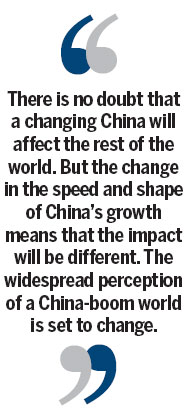China set to be major investor abroad
Updated: 2013-09-20 15:32
By Giles Chance (China Daily)
|
|||||||||||
Beijing's new economic goals will have far-reaching impact on other economies
As China slows, its global impact won't diminish, but it will change.
Since 1990, China's development has been one of the two most important economic factors in the world (the other being, of course, the Internet's evolution). The International Monetary Fund estimates that China's economic output will be 12 percent of the total projected world output this year, and 18 percent when calculated on the basis of purchasing power parity. This year, China is also likely to grow at more than three times the rate of the United States.
In the developed world, China's impact has been more profound, but in a different way. In the 1990s, multinational sourcing based in China started to exert a downward push on consumer inflation in the West. This effect reached its peak in the middle of the "noughties", before China's currency started to strengthen and factory workers' salaries started to rise.
However, it still remains difficult for Westerners to accept that China's rise has brought them, through much lower prices for consumer goods, much more good than bad. But such is the case. China's rise has not just benefited itself. It has brought huge and varied economic benefits to the global economy.
However, that looks set to change as China's policymakers, led by the new prime minister, are focusing more on efficiency than growth. As a result it is quite possible that the annual GDP growth rate may fall.
Some experts feel that this would have major consequences for China. I believe that China's fast-growing western and central provinces will probably support an overall national growth rate of not much lower than 7 percent until the current reforms start to generate new economic growth.
Of course, the outcome could be worse than this, as a question mark still remains over the government's ability to apply and carry through major reforms. In my opinion, the likeliest outcome is that China's growth rate won't fall, but will moderate significantly. Investment in infrastructure will continue, but may be restricted to projects that have tangible future benefits.
Contrary to expectations, exports from China will not collapse. However, the sector will find it difficult to recapture its past glory, as there will be strong growth in imports, fueled by the demand for food and consumer items. Household spending and services will be the mainstay of domestic demand.
There is no doubt that a changing China will affect the rest of the world. But the change in the speed and shape of China's growth means that the impact will be different. The widespread perception of a China-boom world is set to change.
Australia will be one of the nations that would find it extremely difficult to adapt to a changing China. Others like Brazil, Peru and Chile in South America, and South Africa, Angola, Zambia and Zaire in Africa may also feel the pinch. In Asia, South Korea, Malaysia, Thailand, Indonesia and even Japan will be affected by China's slowdown.
In Europe, much of Germany's economic success has been provided by Chinese growth. Nearly 2.5 percent of German GDP depends on exports to China. A slowdown in China will affect the rest of Europe also.

But it won't all be bad news. Driven by competitive domestic markets and a strong currency that makes foreign assets affordable, many Chinese companies will look to expand overseas. Chinese outward investment, which grew last year by 14 percent to $77 billion (58 billion euros), is set to boom.
China's need to expand into high-end markets around the world will continue, underpinned by a currency which is on its way to joining the dollar and the euro as a major global reserve currency. As China continues recycling its current account surplus, investment in foreign government debt will be gradually replaced by overseas equity investments that confer ownership of foreign brands and technology to Chinese companies.
Acquisitions made by Chinese companies will make the country a large equity owner around the world. Last month's agreement at the China-US Strategic and Economic Dialogue to negotiate a mutual direct investment agreement recognizes the inevitability and desirability of China's new global role as an investor.
Since the financial crisis in 2008 we have seen a big change in the way China is viewed around the world. In 2013, more than 34 percent of people considered China to be a leading global economic power, compared with 20 percent in 2008 (according to a recent 38-country survey conducted by PEW Research in Washington, DC). It seems inevitable that China's global cultural influence is set to grow, alongside the country's economic strength.
As many Chinese companies look to invest in foreign markets, they face the challenge of operating in cultures very different to their own. It's not just a problem of speaking a different language, or even of being able to understand foreign laws and accounting regulations. Success overseas ultimately depends on being accepted locally, as German automobile company Volkswagen AG learnt over 30 years, in China. Chinese companies like Lenovo and Haier have already shown the way. Many others will try to follow. Only those flexible enough to understand other cultures will succeed in the long run.
The author is a visiting professor at Guanghua School of Management, Peking University.
(China Daily European Weekly 09/20/2013 page9)
Today's Top News
Verdict of Bo Xilai: Life in prison
Russian embassy to Syria shelled
Gunmen holding hostages in Nairobi
Amber alert across Asia, but not red
China signs 12 deals with Venezuela
Bo Xilai gets life in prison
New Sino-US ties sought
One Chinese killed in Nairobi attack
Hot Topics
Lunar probe , China growth forecasts, Emission rules get tougher, China seen through 'colored lens', International board,
Editor's Picks

|

|

|

|

|

|





